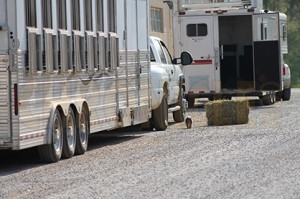Tips to Avoid Getting Locked Out With a Trailer Full of Horses…
USRider
Each year, technology seems to advance in every way possible: from smart phones that have the ability to track our eating habits and daily exercise routines to the seamless work of the drone, a device that can film videos or capture images hundreds of feet above the earth. We are now in the presence of vehicles that don’t require a key, but simply allow you to place your hand on the door handle and the vehicle will unlock by detecting a key fob in your pocket. This advance in technology can be both beneficial and a cause for bad luck if this isn’t something you’re used to.
At USRider, we know that being stranded because of lockout can be an inconvenience, at best. While we’re there for our members when this problem arises, being in this situation can be dangerous, especially when traveling with horses.
While most owners have a spare key for their vehicle, it’s usually at home, possibly far away. USRider recommends installing a hide-a-key in your vehicle. The most common places to put a hide-a-key are under your bumper and inside your wheel well. If you do purchase a hide-a-key, try to think of a good hiding spot on your car so it won’t land in the wrong hands. There are some hide-a-keys that are made to fit your trailer hitch and inside your gas cap.
Getting stranded is stressful enough when it’s just you. Add a trailer with a few horses and the situation could become a big problem. However, having a hide-a-key on your trailer could come in handy. Some individuals place a hide-a-key near hay racks on the top of their trailers. If you’re crafty, you can install a safe on your trailer that requires an access code.
Back in 2007, reports arose of cell phones scrambling electronic keys, which created hefty bills for car owners that needed to purchase new fobs. There have been no recent reports since then. However, new problems have surfaced with newer key fobs that don’t require handling. Newer vehicles now allow drivers to enter and start their vehicles with no key in sight. This is thanks to a small fob that’s scanned by the vehicle. There are not so many issues with lockouts, but some drivers will forget the vehicle is on and walk away, returning to a vehicle with an empty gas tank, or worse.
USRider – in its 13th year of operation – is the only company to provide emergency roadside assistance for horse owners. Through the Equestrian Motor Plan, USRider provides nationwide roadside assistance and towing services along with other travel-related benefits to its Members. The plan includes standard features such as flat-tire repair, battery assistance, lockout services, and roadside repairs for tow vehicles and trailers with horses, plus towing up to 100 miles. As an additional service, USRider maintains a national database that includes emergency stabling, veterinary and farrier referrals.
For more information about the USRider Equestrian Motor Plan, visit www.usrider.org online or call (800) 844-1409. For additional safety and travel tips, visit the Equine Travel Safety Area on the USRider website at www.usrider.org.
About the Equine Network
The Equine Network provides, creates, and distributes relevant content and services to passionate horse enthusiasts while connecting them to each other and the marketplace. The Equine Network is the publisher of award-winning magazines: Horse & Rider, EQUUS, Dressage Today, The Trail Rider, Spin to Win Rodeo, American Cowboy, Practical Horseman, and Horse Journal. The Equine Network also publishes a proprietary line of books and DVDs for sale through its store, HorseBooksEtc.com. The Equine Network provides emergency roadside assistance through its acquisition of USRider, and is home to several websites including: EquiSearch.com, Equine.com, MyHorseDaily.com, DiscoverHorses.com, Horse-Journal.com, and AmericanCowboy.com











